Sociology 5050: Media's Impact on Muslim Women in Politics
VerifiedAdded on 2022/12/12
|12
|2933
|244
Literature Review
AI Summary
This literature review critically analyzes the impact of media on the political participation of Muslim women in India, drawing on various scholarly articles and research papers. The review highlights the significance of media in shaping societal perceptions, influencing political rights, and breaking down barriers to women's involvement in politics. It explores key research methodologies, including qualitative studies and analysis of media's role in shaping public opinion. The review also addresses significant disagreements among researchers regarding the nature of challenges faced by Muslim women in politics, including media biases and societal perceptions. The review examines debates, credible studies, and the impact of media on the political participation of Muslim women in India, highlighting the need for media sensitization and the potential for media to play a pivotal role in promoting gender equality and women's empowerment. The review concludes by positioning itself within the debate, emphasizing that independent studies have been most enjoyable, persuasive and exciting over the topic of discussion.
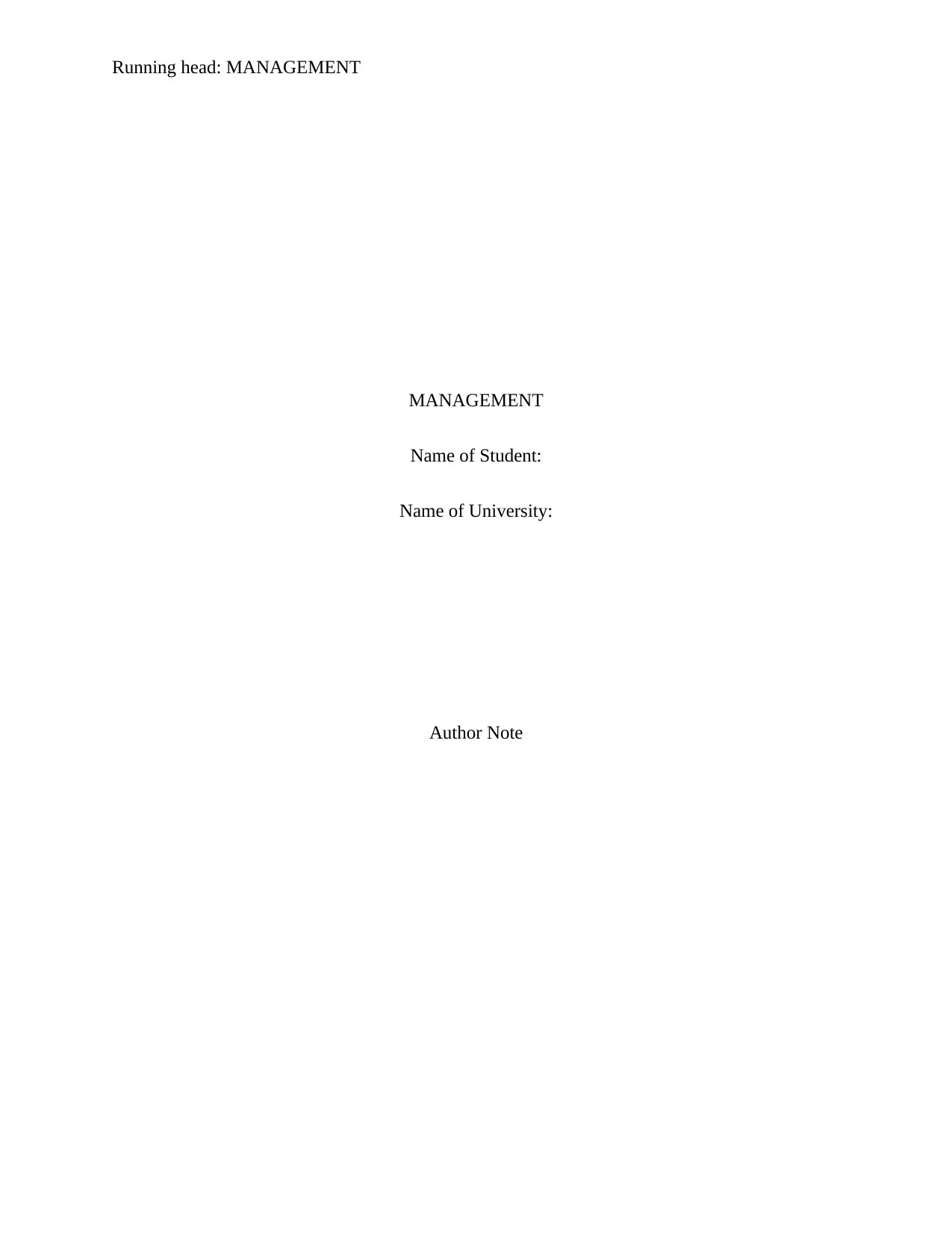
Running head: MANAGEMENT
MANAGEMENT
Name of Student:
Name of University:
Author Note
MANAGEMENT
Name of Student:
Name of University:
Author Note
Paraphrase This Document
Need a fresh take? Get an instant paraphrase of this document with our AI Paraphraser
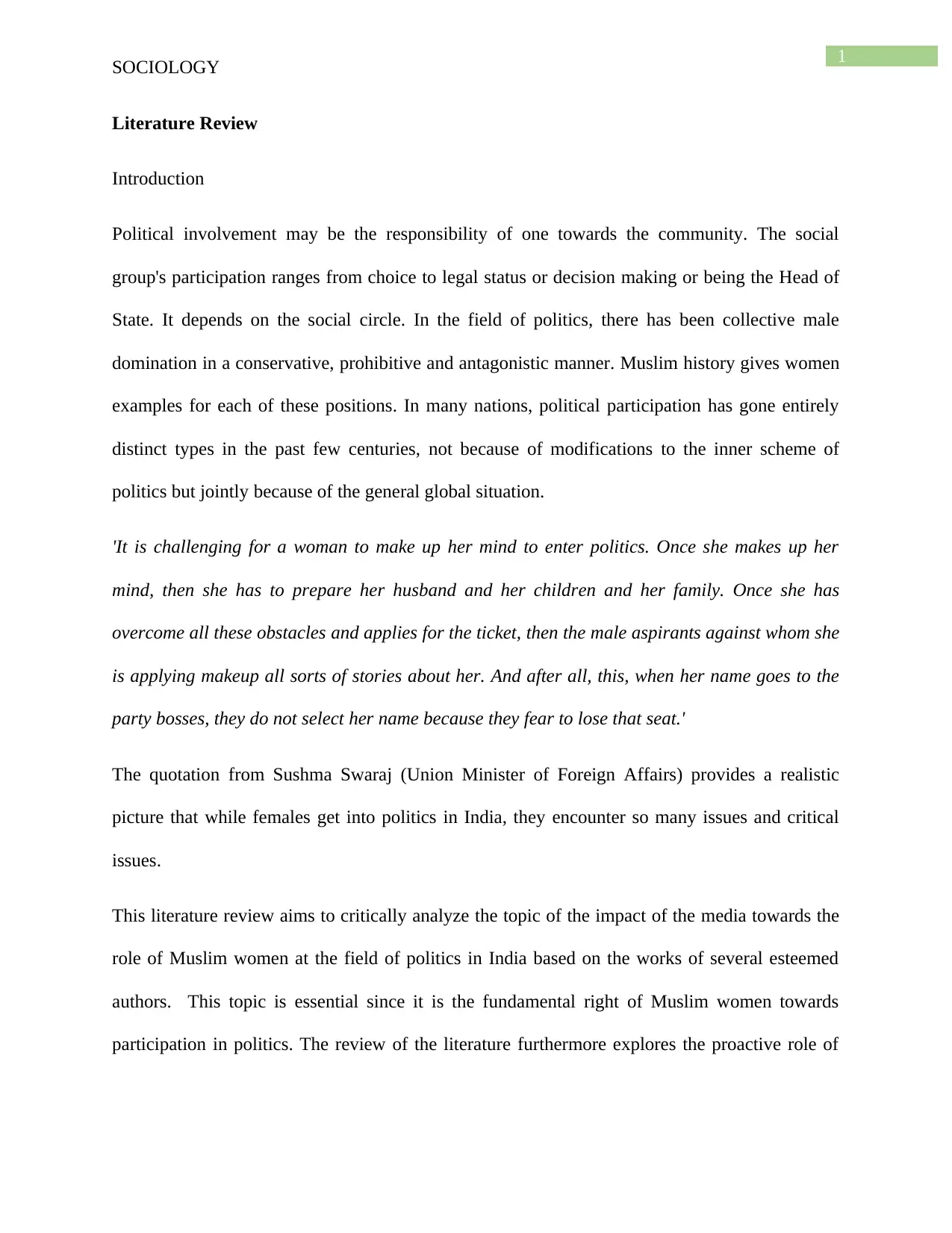
1
SOCIOLOGY
Literature Review
Introduction
Political involvement may be the responsibility of one towards the community. The social
group's participation ranges from choice to legal status or decision making or being the Head of
State. It depends on the social circle. In the field of politics, there has been collective male
domination in a conservative, prohibitive and antagonistic manner. Muslim history gives women
examples for each of these positions. In many nations, political participation has gone entirely
distinct types in the past few centuries, not because of modifications to the inner scheme of
politics but jointly because of the general global situation.
'It is challenging for a woman to make up her mind to enter politics. Once she makes up her
mind, then she has to prepare her husband and her children and her family. Once she has
overcome all these obstacles and applies for the ticket, then the male aspirants against whom she
is applying makeup all sorts of stories about her. And after all, this, when her name goes to the
party bosses, they do not select her name because they fear to lose that seat.'
The quotation from Sushma Swaraj (Union Minister of Foreign Affairs) provides a realistic
picture that while females get into politics in India, they encounter so many issues and critical
issues.
This literature review aims to critically analyze the topic of the impact of the media towards the
role of Muslim women at the field of politics in India based on the works of several esteemed
authors. This topic is essential since it is the fundamental right of Muslim women towards
participation in politics. The review of the literature furthermore explores the proactive role of
SOCIOLOGY
Literature Review
Introduction
Political involvement may be the responsibility of one towards the community. The social
group's participation ranges from choice to legal status or decision making or being the Head of
State. It depends on the social circle. In the field of politics, there has been collective male
domination in a conservative, prohibitive and antagonistic manner. Muslim history gives women
examples for each of these positions. In many nations, political participation has gone entirely
distinct types in the past few centuries, not because of modifications to the inner scheme of
politics but jointly because of the general global situation.
'It is challenging for a woman to make up her mind to enter politics. Once she makes up her
mind, then she has to prepare her husband and her children and her family. Once she has
overcome all these obstacles and applies for the ticket, then the male aspirants against whom she
is applying makeup all sorts of stories about her. And after all, this, when her name goes to the
party bosses, they do not select her name because they fear to lose that seat.'
The quotation from Sushma Swaraj (Union Minister of Foreign Affairs) provides a realistic
picture that while females get into politics in India, they encounter so many issues and critical
issues.
This literature review aims to critically analyze the topic of the impact of the media towards the
role of Muslim women at the field of politics in India based on the works of several esteemed
authors. This topic is essential since it is the fundamental right of Muslim women towards
participation in politics. The review of the literature furthermore explores the proactive role of
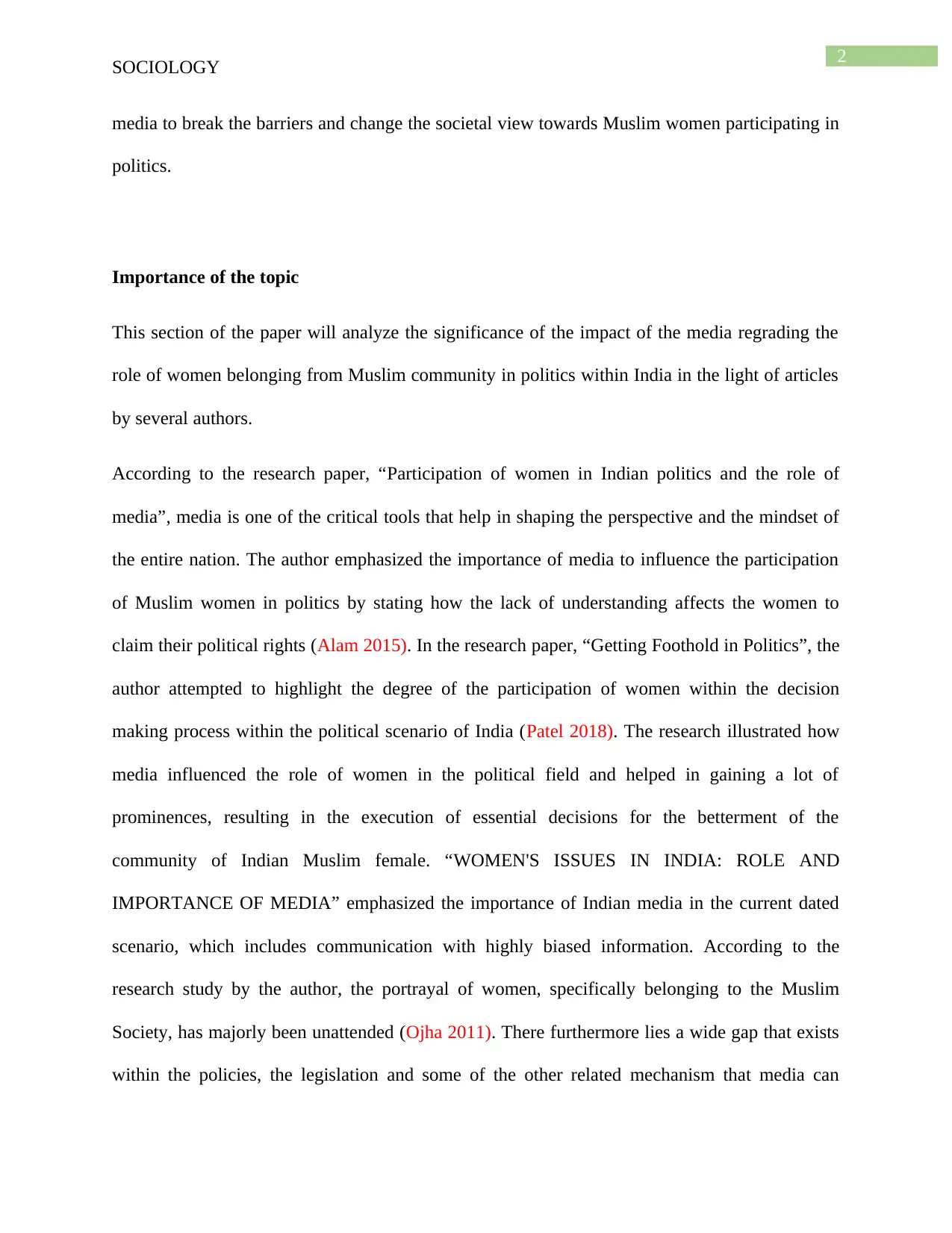
2
SOCIOLOGY
media to break the barriers and change the societal view towards Muslim women participating in
politics.
Importance of the topic
This section of the paper will analyze the significance of the impact of the media regrading the
role of women belonging from Muslim community in politics within India in the light of articles
by several authors.
According to the research paper, “Participation of women in Indian politics and the role of
media”, media is one of the critical tools that help in shaping the perspective and the mindset of
the entire nation. The author emphasized the importance of media to influence the participation
of Muslim women in politics by stating how the lack of understanding affects the women to
claim their political rights (Alam 2015). In the research paper, “Getting Foothold in Politics”, the
author attempted to highlight the degree of the participation of women within the decision
making process within the political scenario of India (Patel 2018). The research illustrated how
media influenced the role of women in the political field and helped in gaining a lot of
prominences, resulting in the execution of essential decisions for the betterment of the
community of Indian Muslim female. “WOMEN'S ISSUES IN INDIA: ROLE AND
IMPORTANCE OF MEDIA” emphasized the importance of Indian media in the current dated
scenario, which includes communication with highly biased information. According to the
research study by the author, the portrayal of women, specifically belonging to the Muslim
Society, has majorly been unattended (Ojha 2011). There furthermore lies a wide gap that exists
within the policies, the legislation and some of the other related mechanism that media can
SOCIOLOGY
media to break the barriers and change the societal view towards Muslim women participating in
politics.
Importance of the topic
This section of the paper will analyze the significance of the impact of the media regrading the
role of women belonging from Muslim community in politics within India in the light of articles
by several authors.
According to the research paper, “Participation of women in Indian politics and the role of
media”, media is one of the critical tools that help in shaping the perspective and the mindset of
the entire nation. The author emphasized the importance of media to influence the participation
of Muslim women in politics by stating how the lack of understanding affects the women to
claim their political rights (Alam 2015). In the research paper, “Getting Foothold in Politics”, the
author attempted to highlight the degree of the participation of women within the decision
making process within the political scenario of India (Patel 2018). The research illustrated how
media influenced the role of women in the political field and helped in gaining a lot of
prominences, resulting in the execution of essential decisions for the betterment of the
community of Indian Muslim female. “WOMEN'S ISSUES IN INDIA: ROLE AND
IMPORTANCE OF MEDIA” emphasized the importance of Indian media in the current dated
scenario, which includes communication with highly biased information. According to the
research study by the author, the portrayal of women, specifically belonging to the Muslim
Society, has majorly been unattended (Ojha 2011). There furthermore lies a wide gap that exists
within the policies, the legislation and some of the other related mechanism that media can
⊘ This is a preview!⊘
Do you want full access?
Subscribe today to unlock all pages.

Trusted by 1+ million students worldwide
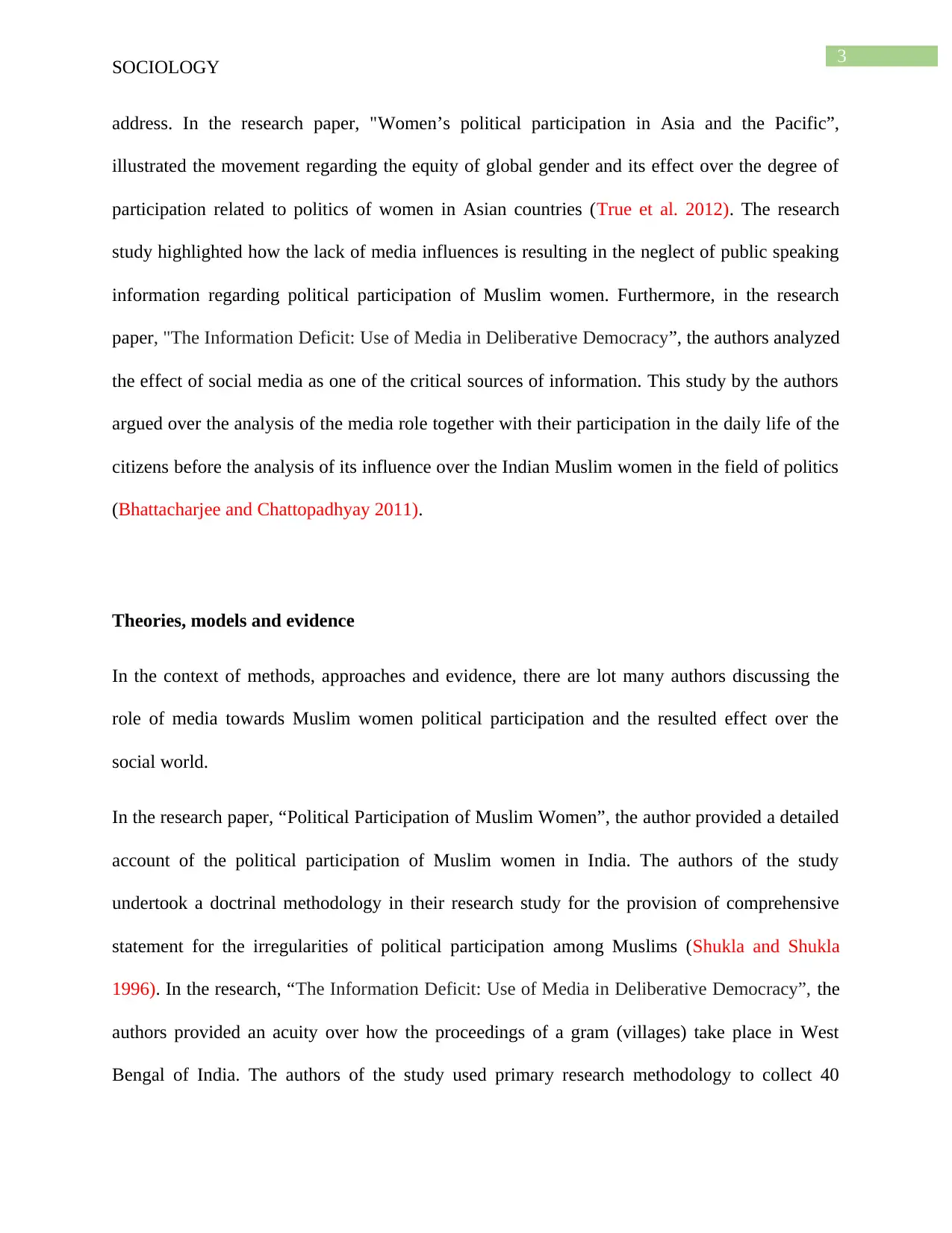
3
SOCIOLOGY
address. In the research paper, "Women’s political participation in Asia and the Pacific”,
illustrated the movement regarding the equity of global gender and its effect over the degree of
participation related to politics of women in Asian countries (True et al. 2012). The research
study highlighted how the lack of media influences is resulting in the neglect of public speaking
information regarding political participation of Muslim women. Furthermore, in the research
paper, "The Information Deficit: Use of Media in Deliberative Democracy”, the authors analyzed
the effect of social media as one of the critical sources of information. This study by the authors
argued over the analysis of the media role together with their participation in the daily life of the
citizens before the analysis of its influence over the Indian Muslim women in the field of politics
(Bhattacharjee and Chattopadhyay 2011).
Theories, models and evidence
In the context of methods, approaches and evidence, there are lot many authors discussing the
role of media towards Muslim women political participation and the resulted effect over the
social world.
In the research paper, “Political Participation of Muslim Women”, the author provided a detailed
account of the political participation of Muslim women in India. The authors of the study
undertook a doctrinal methodology in their research study for the provision of comprehensive
statement for the irregularities of political participation among Muslims (Shukla and Shukla
1996). In the research, “The Information Deficit: Use of Media in Deliberative Democracy”, the
authors provided an acuity over how the proceedings of a gram (villages) take place in West
Bengal of India. The authors of the study used primary research methodology to collect 40
SOCIOLOGY
address. In the research paper, "Women’s political participation in Asia and the Pacific”,
illustrated the movement regarding the equity of global gender and its effect over the degree of
participation related to politics of women in Asian countries (True et al. 2012). The research
study highlighted how the lack of media influences is resulting in the neglect of public speaking
information regarding political participation of Muslim women. Furthermore, in the research
paper, "The Information Deficit: Use of Media in Deliberative Democracy”, the authors analyzed
the effect of social media as one of the critical sources of information. This study by the authors
argued over the analysis of the media role together with their participation in the daily life of the
citizens before the analysis of its influence over the Indian Muslim women in the field of politics
(Bhattacharjee and Chattopadhyay 2011).
Theories, models and evidence
In the context of methods, approaches and evidence, there are lot many authors discussing the
role of media towards Muslim women political participation and the resulted effect over the
social world.
In the research paper, “Political Participation of Muslim Women”, the author provided a detailed
account of the political participation of Muslim women in India. The authors of the study
undertook a doctrinal methodology in their research study for the provision of comprehensive
statement for the irregularities of political participation among Muslims (Shukla and Shukla
1996). In the research, “The Information Deficit: Use of Media in Deliberative Democracy”, the
authors provided an acuity over how the proceedings of a gram (villages) take place in West
Bengal of India. The authors of the study used primary research methodology to collect 40
Paraphrase This Document
Need a fresh take? Get an instant paraphrase of this document with our AI Paraphraser
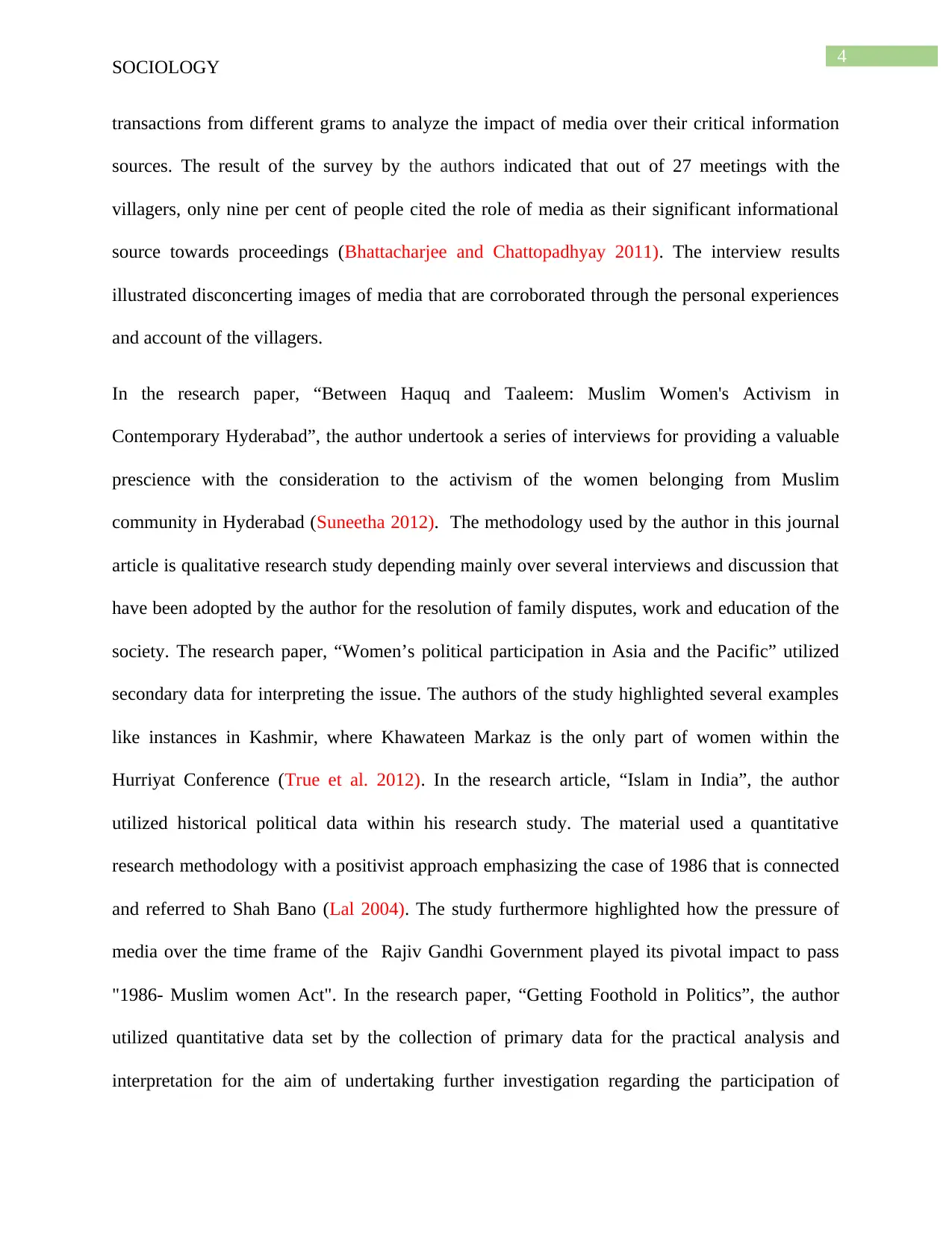
4
SOCIOLOGY
transactions from different grams to analyze the impact of media over their critical information
sources. The result of the survey by the authors indicated that out of 27 meetings with the
villagers, only nine per cent of people cited the role of media as their significant informational
source towards proceedings (Bhattacharjee and Chattopadhyay 2011). The interview results
illustrated disconcerting images of media that are corroborated through the personal experiences
and account of the villagers.
In the research paper, “Between Haquq and Taaleem: Muslim Women's Activism in
Contemporary Hyderabad”, the author undertook a series of interviews for providing a valuable
prescience with the consideration to the activism of the women belonging from Muslim
community in Hyderabad (Suneetha 2012). The methodology used by the author in this journal
article is qualitative research study depending mainly over several interviews and discussion that
have been adopted by the author for the resolution of family disputes, work and education of the
society. The research paper, “Women’s political participation in Asia and the Pacific” utilized
secondary data for interpreting the issue. The authors of the study highlighted several examples
like instances in Kashmir, where Khawateen Markaz is the only part of women within the
Hurriyat Conference (True et al. 2012). In the research article, “Islam in India”, the author
utilized historical political data within his research study. The material used a quantitative
research methodology with a positivist approach emphasizing the case of 1986 that is connected
and referred to Shah Bano (Lal 2004). The study furthermore highlighted how the pressure of
media over the time frame of the Rajiv Gandhi Government played its pivotal impact to pass
"1986- Muslim women Act". In the research paper, “Getting Foothold in Politics”, the author
utilized quantitative data set by the collection of primary data for the practical analysis and
interpretation for the aim of undertaking further investigation regarding the participation of
SOCIOLOGY
transactions from different grams to analyze the impact of media over their critical information
sources. The result of the survey by the authors indicated that out of 27 meetings with the
villagers, only nine per cent of people cited the role of media as their significant informational
source towards proceedings (Bhattacharjee and Chattopadhyay 2011). The interview results
illustrated disconcerting images of media that are corroborated through the personal experiences
and account of the villagers.
In the research paper, “Between Haquq and Taaleem: Muslim Women's Activism in
Contemporary Hyderabad”, the author undertook a series of interviews for providing a valuable
prescience with the consideration to the activism of the women belonging from Muslim
community in Hyderabad (Suneetha 2012). The methodology used by the author in this journal
article is qualitative research study depending mainly over several interviews and discussion that
have been adopted by the author for the resolution of family disputes, work and education of the
society. The research paper, “Women’s political participation in Asia and the Pacific” utilized
secondary data for interpreting the issue. The authors of the study highlighted several examples
like instances in Kashmir, where Khawateen Markaz is the only part of women within the
Hurriyat Conference (True et al. 2012). In the research article, “Islam in India”, the author
utilized historical political data within his research study. The material used a quantitative
research methodology with a positivist approach emphasizing the case of 1986 that is connected
and referred to Shah Bano (Lal 2004). The study furthermore highlighted how the pressure of
media over the time frame of the Rajiv Gandhi Government played its pivotal impact to pass
"1986- Muslim women Act". In the research paper, “Getting Foothold in Politics”, the author
utilized quantitative data set by the collection of primary data for the practical analysis and
interpretation for the aim of undertaking further investigation regarding the participation of
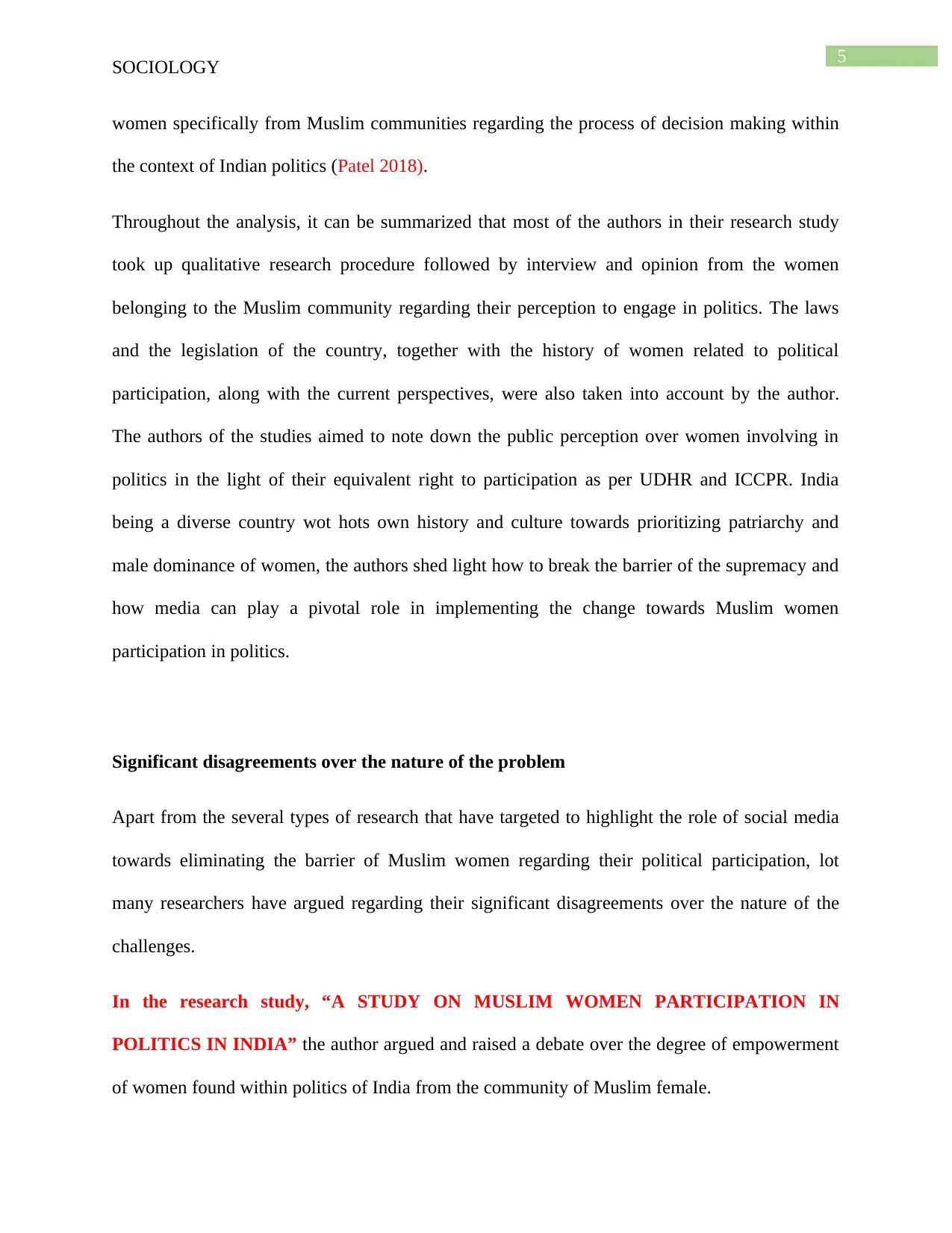
5
SOCIOLOGY
women specifically from Muslim communities regarding the process of decision making within
the context of Indian politics (Patel 2018).
Throughout the analysis, it can be summarized that most of the authors in their research study
took up qualitative research procedure followed by interview and opinion from the women
belonging to the Muslim community regarding their perception to engage in politics. The laws
and the legislation of the country, together with the history of women related to political
participation, along with the current perspectives, were also taken into account by the author.
The authors of the studies aimed to note down the public perception over women involving in
politics in the light of their equivalent right to participation as per UDHR and ICCPR. India
being a diverse country wot hots own history and culture towards prioritizing patriarchy and
male dominance of women, the authors shed light how to break the barrier of the supremacy and
how media can play a pivotal role in implementing the change towards Muslim women
participation in politics.
Significant disagreements over the nature of the problem
Apart from the several types of research that have targeted to highlight the role of social media
towards eliminating the barrier of Muslim women regarding their political participation, lot
many researchers have argued regarding their significant disagreements over the nature of the
challenges.
In the research study, “A STUDY ON MUSLIM WOMEN PARTICIPATION IN
POLITICS IN INDIA” the author argued and raised a debate over the degree of empowerment
of women found within politics of India from the community of Muslim female.
SOCIOLOGY
women specifically from Muslim communities regarding the process of decision making within
the context of Indian politics (Patel 2018).
Throughout the analysis, it can be summarized that most of the authors in their research study
took up qualitative research procedure followed by interview and opinion from the women
belonging to the Muslim community regarding their perception to engage in politics. The laws
and the legislation of the country, together with the history of women related to political
participation, along with the current perspectives, were also taken into account by the author.
The authors of the studies aimed to note down the public perception over women involving in
politics in the light of their equivalent right to participation as per UDHR and ICCPR. India
being a diverse country wot hots own history and culture towards prioritizing patriarchy and
male dominance of women, the authors shed light how to break the barrier of the supremacy and
how media can play a pivotal role in implementing the change towards Muslim women
participation in politics.
Significant disagreements over the nature of the problem
Apart from the several types of research that have targeted to highlight the role of social media
towards eliminating the barrier of Muslim women regarding their political participation, lot
many researchers have argued regarding their significant disagreements over the nature of the
challenges.
In the research study, “A STUDY ON MUSLIM WOMEN PARTICIPATION IN
POLITICS IN INDIA” the author argued and raised a debate over the degree of empowerment
of women found within politics of India from the community of Muslim female.
⊘ This is a preview!⊘
Do you want full access?
Subscribe today to unlock all pages.

Trusted by 1+ million students worldwide
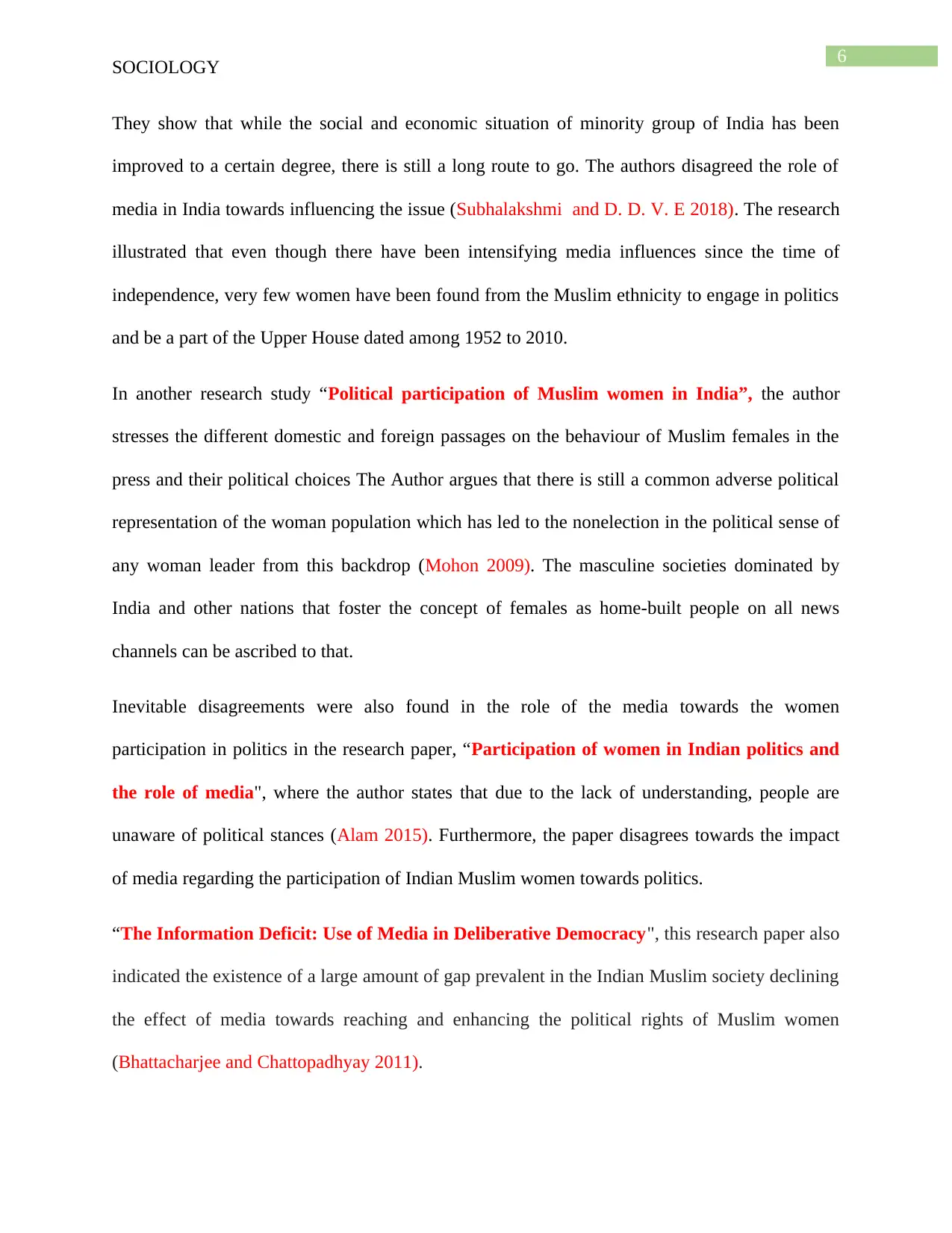
6
SOCIOLOGY
They show that while the social and economic situation of minority group of India has been
improved to a certain degree, there is still a long route to go. The authors disagreed the role of
media in India towards influencing the issue (Subhalakshmi and D. D. V. E 2018). The research
illustrated that even though there have been intensifying media influences since the time of
independence, very few women have been found from the Muslim ethnicity to engage in politics
and be a part of the Upper House dated among 1952 to 2010.
In another research study “Political participation of Muslim women in India”, the author
stresses the different domestic and foreign passages on the behaviour of Muslim females in the
press and their political choices The Author argues that there is still a common adverse political
representation of the woman population which has led to the nonelection in the political sense of
any woman leader from this backdrop (Mohon 2009). The masculine societies dominated by
India and other nations that foster the concept of females as home-built people on all news
channels can be ascribed to that.
Inevitable disagreements were also found in the role of the media towards the women
participation in politics in the research paper, “Participation of women in Indian politics and
the role of media", where the author states that due to the lack of understanding, people are
unaware of political stances (Alam 2015). Furthermore, the paper disagrees towards the impact
of media regarding the participation of Indian Muslim women towards politics.
“The Information Deficit: Use of Media in Deliberative Democracy", this research paper also
indicated the existence of a large amount of gap prevalent in the Indian Muslim society declining
the effect of media towards reaching and enhancing the political rights of Muslim women
(Bhattacharjee and Chattopadhyay 2011).
SOCIOLOGY
They show that while the social and economic situation of minority group of India has been
improved to a certain degree, there is still a long route to go. The authors disagreed the role of
media in India towards influencing the issue (Subhalakshmi and D. D. V. E 2018). The research
illustrated that even though there have been intensifying media influences since the time of
independence, very few women have been found from the Muslim ethnicity to engage in politics
and be a part of the Upper House dated among 1952 to 2010.
In another research study “Political participation of Muslim women in India”, the author
stresses the different domestic and foreign passages on the behaviour of Muslim females in the
press and their political choices The Author argues that there is still a common adverse political
representation of the woman population which has led to the nonelection in the political sense of
any woman leader from this backdrop (Mohon 2009). The masculine societies dominated by
India and other nations that foster the concept of females as home-built people on all news
channels can be ascribed to that.
Inevitable disagreements were also found in the role of the media towards the women
participation in politics in the research paper, “Participation of women in Indian politics and
the role of media", where the author states that due to the lack of understanding, people are
unaware of political stances (Alam 2015). Furthermore, the paper disagrees towards the impact
of media regarding the participation of Indian Muslim women towards politics.
“The Information Deficit: Use of Media in Deliberative Democracy", this research paper also
indicated the existence of a large amount of gap prevalent in the Indian Muslim society declining
the effect of media towards reaching and enhancing the political rights of Muslim women
(Bhattacharjee and Chattopadhyay 2011).
Paraphrase This Document
Need a fresh take? Get an instant paraphrase of this document with our AI Paraphraser
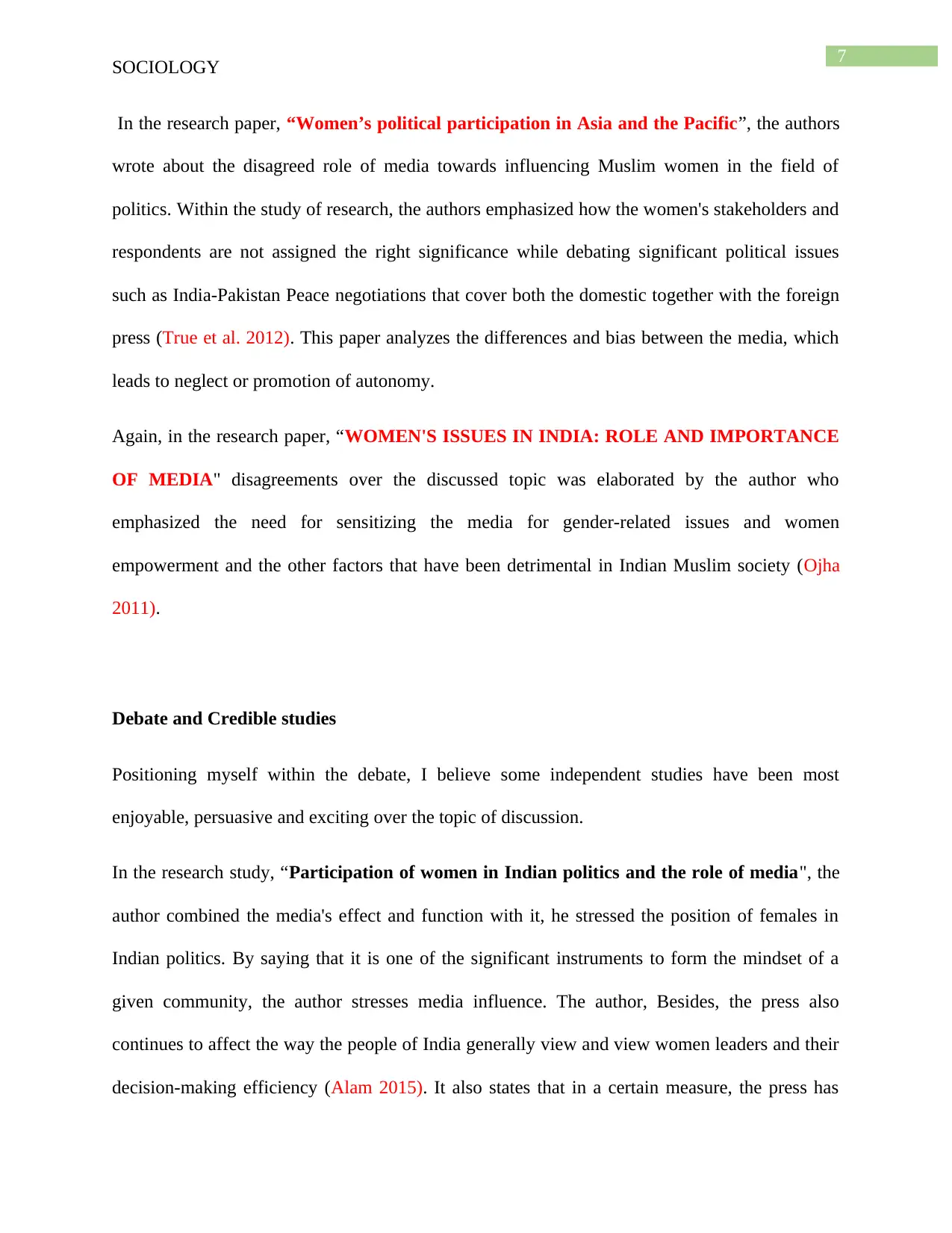
7
SOCIOLOGY
In the research paper, “Women’s political participation in Asia and the Pacific”, the authors
wrote about the disagreed role of media towards influencing Muslim women in the field of
politics. Within the study of research, the authors emphasized how the women's stakeholders and
respondents are not assigned the right significance while debating significant political issues
such as India-Pakistan Peace negotiations that cover both the domestic together with the foreign
press (True et al. 2012). This paper analyzes the differences and bias between the media, which
leads to neglect or promotion of autonomy.
Again, in the research paper, “WOMEN'S ISSUES IN INDIA: ROLE AND IMPORTANCE
OF MEDIA" disagreements over the discussed topic was elaborated by the author who
emphasized the need for sensitizing the media for gender-related issues and women
empowerment and the other factors that have been detrimental in Indian Muslim society (Ojha
2011).
Debate and Credible studies
Positioning myself within the debate, I believe some independent studies have been most
enjoyable, persuasive and exciting over the topic of discussion.
In the research study, “Participation of women in Indian politics and the role of media", the
author combined the media's effect and function with it, he stressed the position of females in
Indian politics. By saying that it is one of the significant instruments to form the mindset of a
given community, the author stresses media influence. The author, Besides, the press also
continues to affect the way the people of India generally view and view women leaders and their
decision-making efficiency (Alam 2015). It also states that in a certain measure, the press has
SOCIOLOGY
In the research paper, “Women’s political participation in Asia and the Pacific”, the authors
wrote about the disagreed role of media towards influencing Muslim women in the field of
politics. Within the study of research, the authors emphasized how the women's stakeholders and
respondents are not assigned the right significance while debating significant political issues
such as India-Pakistan Peace negotiations that cover both the domestic together with the foreign
press (True et al. 2012). This paper analyzes the differences and bias between the media, which
leads to neglect or promotion of autonomy.
Again, in the research paper, “WOMEN'S ISSUES IN INDIA: ROLE AND IMPORTANCE
OF MEDIA" disagreements over the discussed topic was elaborated by the author who
emphasized the need for sensitizing the media for gender-related issues and women
empowerment and the other factors that have been detrimental in Indian Muslim society (Ojha
2011).
Debate and Credible studies
Positioning myself within the debate, I believe some independent studies have been most
enjoyable, persuasive and exciting over the topic of discussion.
In the research study, “Participation of women in Indian politics and the role of media", the
author combined the media's effect and function with it, he stressed the position of females in
Indian politics. By saying that it is one of the significant instruments to form the mindset of a
given community, the author stresses media influence. The author, Besides, the press also
continues to affect the way the people of India generally view and view women leaders and their
decision-making efficiency (Alam 2015). It also states that in a certain measure, the press has
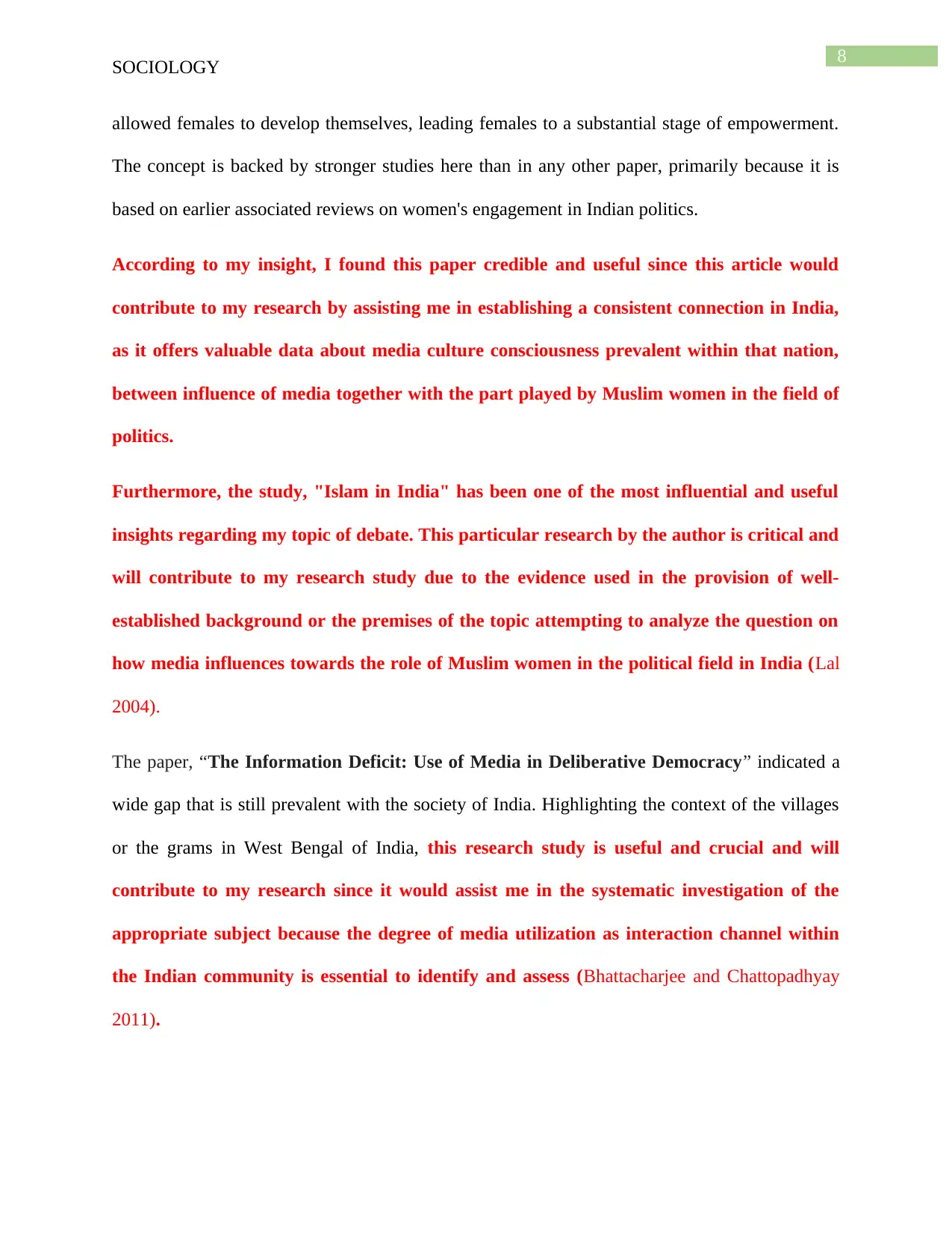
8
SOCIOLOGY
allowed females to develop themselves, leading females to a substantial stage of empowerment.
The concept is backed by stronger studies here than in any other paper, primarily because it is
based on earlier associated reviews on women's engagement in Indian politics.
According to my insight, I found this paper credible and useful since this article would
contribute to my research by assisting me in establishing a consistent connection in India,
as it offers valuable data about media culture consciousness prevalent within that nation,
between influence of media together with the part played by Muslim women in the field of
politics.
Furthermore, the study, "Islam in India" has been one of the most influential and useful
insights regarding my topic of debate. This particular research by the author is critical and
will contribute to my research study due to the evidence used in the provision of well-
established background or the premises of the topic attempting to analyze the question on
how media influences towards the role of Muslim women in the political field in India (Lal
2004).
The paper, “The Information Deficit: Use of Media in Deliberative Democracy” indicated a
wide gap that is still prevalent with the society of India. Highlighting the context of the villages
or the grams in West Bengal of India, this research study is useful and crucial and will
contribute to my research since it would assist me in the systematic investigation of the
appropriate subject because the degree of media utilization as interaction channel within
the Indian community is essential to identify and assess (Bhattacharjee and Chattopadhyay
2011).
SOCIOLOGY
allowed females to develop themselves, leading females to a substantial stage of empowerment.
The concept is backed by stronger studies here than in any other paper, primarily because it is
based on earlier associated reviews on women's engagement in Indian politics.
According to my insight, I found this paper credible and useful since this article would
contribute to my research by assisting me in establishing a consistent connection in India,
as it offers valuable data about media culture consciousness prevalent within that nation,
between influence of media together with the part played by Muslim women in the field of
politics.
Furthermore, the study, "Islam in India" has been one of the most influential and useful
insights regarding my topic of debate. This particular research by the author is critical and
will contribute to my research study due to the evidence used in the provision of well-
established background or the premises of the topic attempting to analyze the question on
how media influences towards the role of Muslim women in the political field in India (Lal
2004).
The paper, “The Information Deficit: Use of Media in Deliberative Democracy” indicated a
wide gap that is still prevalent with the society of India. Highlighting the context of the villages
or the grams in West Bengal of India, this research study is useful and crucial and will
contribute to my research since it would assist me in the systematic investigation of the
appropriate subject because the degree of media utilization as interaction channel within
the Indian community is essential to identify and assess (Bhattacharjee and Chattopadhyay
2011).
⊘ This is a preview!⊘
Do you want full access?
Subscribe today to unlock all pages.

Trusted by 1+ million students worldwide
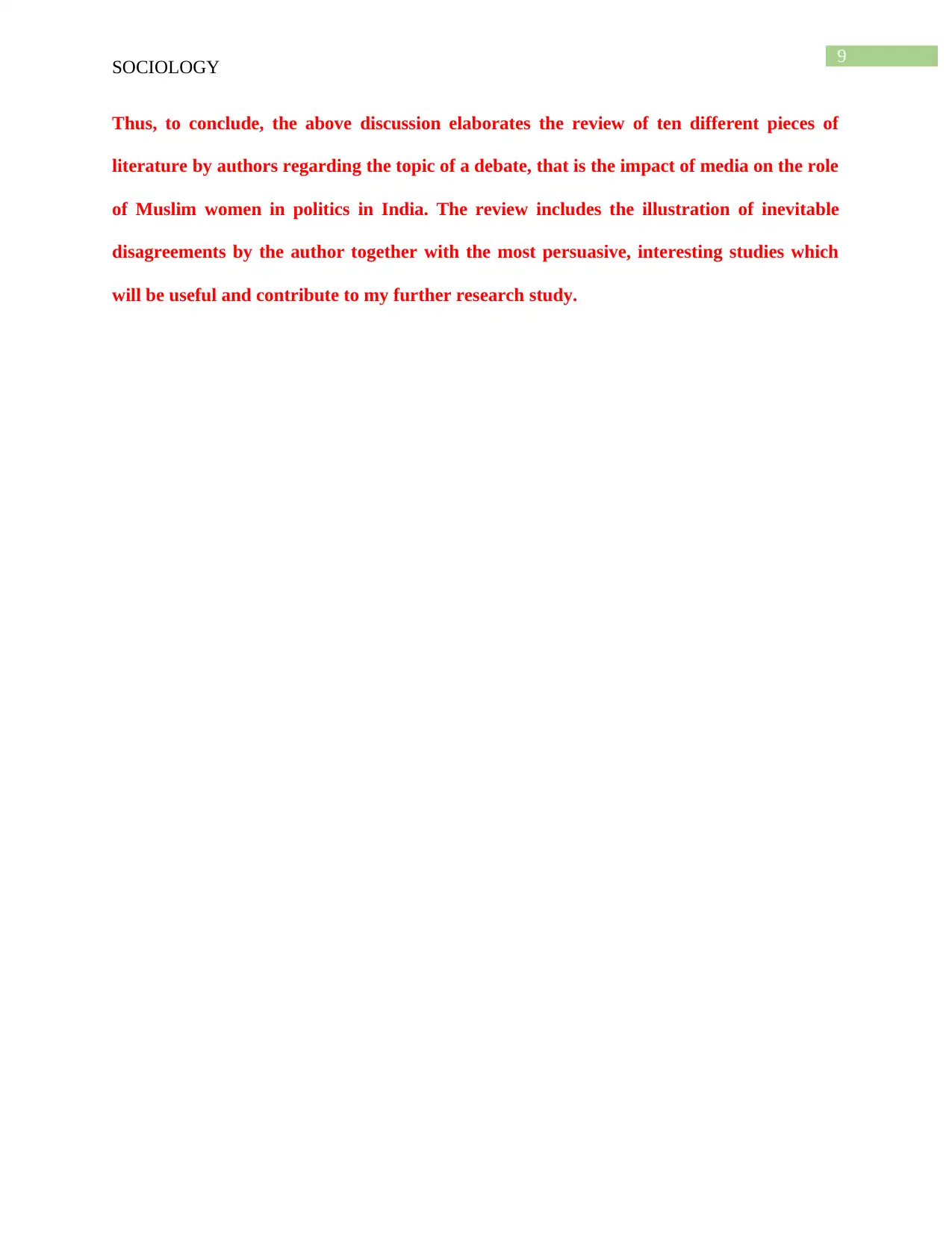
9
SOCIOLOGY
Thus, to conclude, the above discussion elaborates the review of ten different pieces of
literature by authors regarding the topic of a debate, that is the impact of media on the role
of Muslim women in politics in India. The review includes the illustration of inevitable
disagreements by the author together with the most persuasive, interesting studies which
will be useful and contribute to my further research study.
SOCIOLOGY
Thus, to conclude, the above discussion elaborates the review of ten different pieces of
literature by authors regarding the topic of a debate, that is the impact of media on the role
of Muslim women in politics in India. The review includes the illustration of inevitable
disagreements by the author together with the most persuasive, interesting studies which
will be useful and contribute to my further research study.
Paraphrase This Document
Need a fresh take? Get an instant paraphrase of this document with our AI Paraphraser
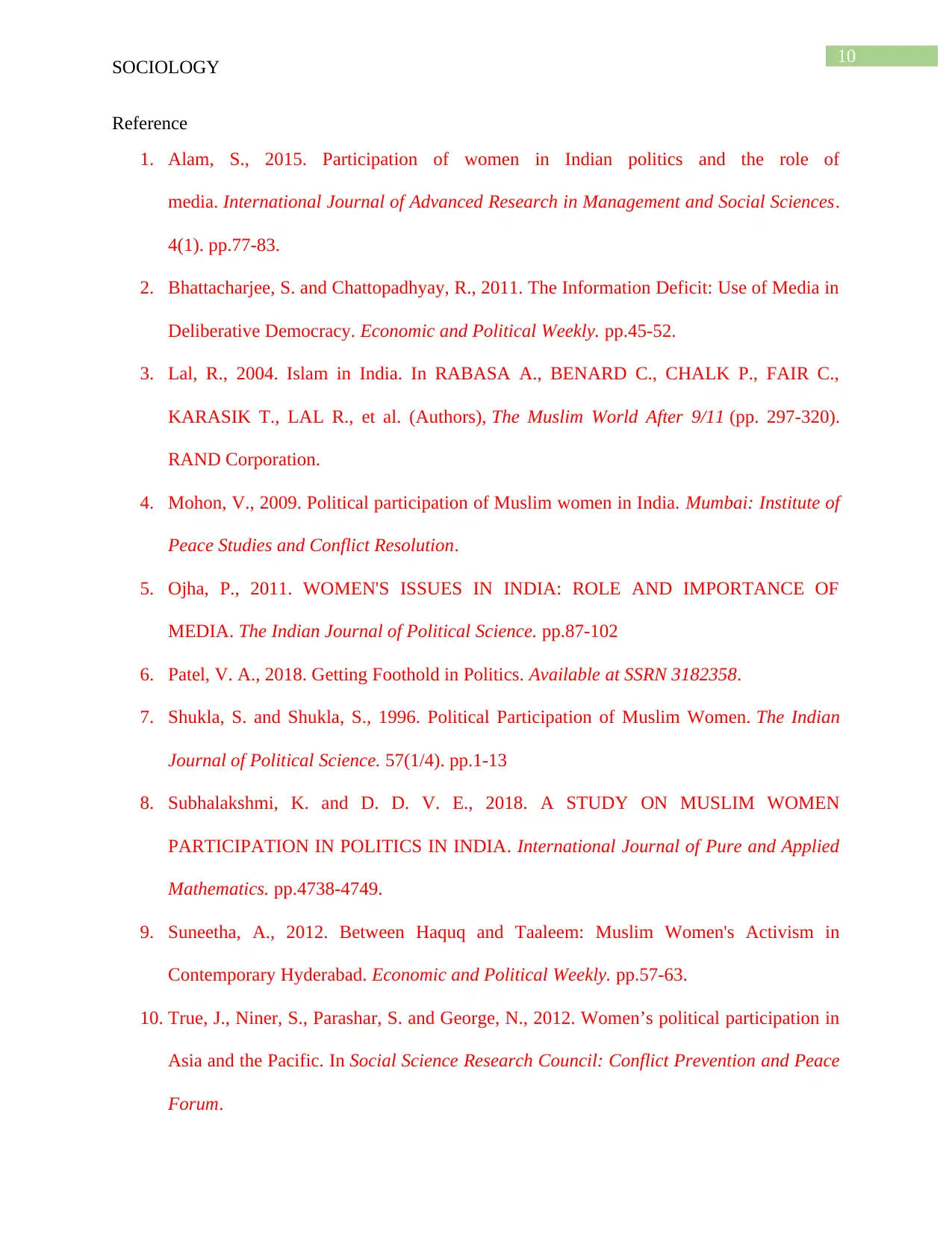
10
SOCIOLOGY
Reference
1. Alam, S., 2015. Participation of women in Indian politics and the role of
media. International Journal of Advanced Research in Management and Social Sciences.
4(1). pp.77-83.
2. Bhattacharjee, S. and Chattopadhyay, R., 2011. The Information Deficit: Use of Media in
Deliberative Democracy. Economic and Political Weekly. pp.45-52.
3. Lal, R., 2004. Islam in India. In RABASA A., BENARD C., CHALK P., FAIR C.,
KARASIK T., LAL R., et al. (Authors), The Muslim World After 9/11 (pp. 297-320).
RAND Corporation.
4. Mohon, V., 2009. Political participation of Muslim women in India. Mumbai: Institute of
Peace Studies and Conflict Resolution.
5. Ojha, P., 2011. WOMEN'S ISSUES IN INDIA: ROLE AND IMPORTANCE OF
MEDIA. The Indian Journal of Political Science. pp.87-102
6. Patel, V. A., 2018. Getting Foothold in Politics. Available at SSRN 3182358.
7. Shukla, S. and Shukla, S., 1996. Political Participation of Muslim Women. The Indian
Journal of Political Science. 57(1/4). pp.1-13
8. Subhalakshmi, K. and D. D. V. E., 2018. A STUDY ON MUSLIM WOMEN
PARTICIPATION IN POLITICS IN INDIA. International Journal of Pure and Applied
Mathematics. pp.4738-4749.
9. Suneetha, A., 2012. Between Haquq and Taaleem: Muslim Women's Activism in
Contemporary Hyderabad. Economic and Political Weekly. pp.57-63.
10. True, J., Niner, S., Parashar, S. and George, N., 2012. Women’s political participation in
Asia and the Pacific. In Social Science Research Council: Conflict Prevention and Peace
Forum.
SOCIOLOGY
Reference
1. Alam, S., 2015. Participation of women in Indian politics and the role of
media. International Journal of Advanced Research in Management and Social Sciences.
4(1). pp.77-83.
2. Bhattacharjee, S. and Chattopadhyay, R., 2011. The Information Deficit: Use of Media in
Deliberative Democracy. Economic and Political Weekly. pp.45-52.
3. Lal, R., 2004. Islam in India. In RABASA A., BENARD C., CHALK P., FAIR C.,
KARASIK T., LAL R., et al. (Authors), The Muslim World After 9/11 (pp. 297-320).
RAND Corporation.
4. Mohon, V., 2009. Political participation of Muslim women in India. Mumbai: Institute of
Peace Studies and Conflict Resolution.
5. Ojha, P., 2011. WOMEN'S ISSUES IN INDIA: ROLE AND IMPORTANCE OF
MEDIA. The Indian Journal of Political Science. pp.87-102
6. Patel, V. A., 2018. Getting Foothold in Politics. Available at SSRN 3182358.
7. Shukla, S. and Shukla, S., 1996. Political Participation of Muslim Women. The Indian
Journal of Political Science. 57(1/4). pp.1-13
8. Subhalakshmi, K. and D. D. V. E., 2018. A STUDY ON MUSLIM WOMEN
PARTICIPATION IN POLITICS IN INDIA. International Journal of Pure and Applied
Mathematics. pp.4738-4749.
9. Suneetha, A., 2012. Between Haquq and Taaleem: Muslim Women's Activism in
Contemporary Hyderabad. Economic and Political Weekly. pp.57-63.
10. True, J., Niner, S., Parashar, S. and George, N., 2012. Women’s political participation in
Asia and the Pacific. In Social Science Research Council: Conflict Prevention and Peace
Forum.

11
SOCIOLOGY
SOCIOLOGY
⊘ This is a preview!⊘
Do you want full access?
Subscribe today to unlock all pages.

Trusted by 1+ million students worldwide
1 out of 12
Related Documents
Your All-in-One AI-Powered Toolkit for Academic Success.
+13062052269
info@desklib.com
Available 24*7 on WhatsApp / Email
![[object Object]](/_next/static/media/star-bottom.7253800d.svg)
Unlock your academic potential
Copyright © 2020–2025 A2Z Services. All Rights Reserved. Developed and managed by ZUCOL.





